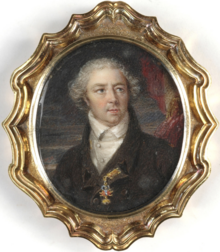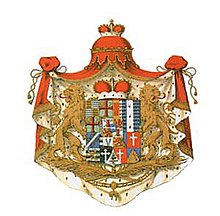Karl Alexander von Thurn and Taxis

Karl Alexander von Thurn and Taxis (born February 22, 1770 in Regensburg , † July 15, 1827 at Taxis Castle near Dischingen ) was the fifth Prince of Thurn and Taxis . He was the son of Karl Anselm von Thurn und Taxis and Auguste von Württemberg. With the death of his father on November 13, 1805, he was nominally General Hereditary Postmaster of the Imperial Postal Service , which officially came to an end with the laying down of the Imperial Crown of the Holy Roman Empire by Franz II . Karl Alexander then ran a private postal company, the Thurn-und-Taxis-Post , which was initially based on a feudal basis .
With the death of his father, he also received the viril vote in the Imperial Council of Princes, which was linked to the title of heir-general postmaster . He also became Prince Count of Friedberg-Scheer and Prince of the Imperial Principality of Buchau with the associated second virile vote in the Imperial Council of Dukes. In 1808 he became Crown Postmaster in Bavaria, in 1818 hereditary member of the Chamber of Imperial Councils in Bavaria, in 1819 Prussian Prince von Krotoszyn and hereditary member of the First Chamber in Württemberg and in 1823 received the Bohemian Incolat in the gentry.
Life
After studying at the universities of Strasbourg , Würzburg and Mainz and a subsequent trip to Europe, he married Therese Mathilde von Mecklenburg-Strelitz , daughter of the Hereditary Prince Duke Charles (II.) Of Mecklenburg [-Strelitz] and Friederike von Hessen on May 25, 1789 in Neustrelitz -Darmstadt . In 1797 he succeeded his ailing father as principal commissioner at the Perpetual Diet in Regensburg. He was also active in the Imperial Post Office operated by the Thurn and Taxis and witnessed the decline with the gradual loss of territory through the Revolutionary Wars and Napoleon's conquests.
Post office continues to operate
After the end of the Holy Roman Empire, part of the Imperial Post Office managed to survive as a private company under Karl Alexander. Since 1806 he has been running a postal company, the Thurn-und-Taxis-Post , initially as a fief of some Rheinbund members such as Baden , Bavaria and Württemberg . Bavaria, however, dropped out two years later and nationalized the postal system.

After the Congress of Vienna , several smaller territories turned to Prince Karl Alexander to organize mail delivery for them. So he took over the Hessian and Thuringian postal system, the free Hanseatic cities of Bremen , Hamburg and Lübeck , as well as Schaffhausen . From 1820 the company began to prosper again, so that he could think of buying land.
Acquisition of new land
According to the Rheinbund Act, which had been agreed between Napoleon and the princes united in the Rheinbund, the imperial principality of Buchau , which was created in 1803 (the Swabian county of Friedberg- Scheer , acquired by his father in 1786 and upgraded to a principality , which had been expanded by secularized areas) lost its independence in 1806 and was mediatized . Since then, the Princes of Thurn and Taxis and thus also Karl Alexander were subjects of the King of Württemberg or the Prince of Hohenzollern-Sigmaringen, depending on the area .
Ownership was reorganized during the Congress of Vienna . Not least thanks to the successful negotiations of his wife, Princess Therese, the Thurn and Taxis house received the possession and usufruct of the former postal service back under Article 17 of the German Federal Act , unless compensation was paid by the sovereigns. In addition, the Thurn und Taxis received the territories belonging to the Imperial Abbey of St. Emmeram in Regensburg and also acquired land from the new Kingdom of Bavaria from the property of the former Prince Primate Dalberg , east of St. Emmeran Monastery in the southern apron of the then still existing Regensburg city wall. The botanical society operated a garden on this property until 1809, and Count von Sternberg had a garden palace built there, which in 1813, in a ruined state, came into the possession of the Thurn und Taxis family. These properties and the Theresens Ruh garden palace , which was renovated for his wife Therese , formed the basis for the creation of today's Thurn und Taxis Palace Park.
After the mediatization, the Thurn and Taxis were considered noblemen , but were still allowed to call themselves princes. In 1819, as head of the Thurn und Taxis family, Karl Alexander received the Polish rule Krotoschin in the Grand Duchy of Posen, which belonged to Prussia, including the title of Prince of Krotoszyn, as compensation for the post offices lost to Prussia . In 1822/23 he bought the Richenburg and Chraustowitz estates in Bohemia from Count Philipp Kinsky .
Freemasonry
He was the second grand master of the Freemasons - Mother Lodge The Growing to the Three Keys , which in 1805 was renamed Carl to the Three Keys in his honor . In 1806 he was appointed Provincial Grand Master of Bavaria by the English Grand Master. He was best known for accepting servants and lackeys as full members of the lodge, which was still unusual at the time. When Regensburg fell to Bavaria in 1810, the grand lodge ceased to exist because of the anti-Freemason laws that were in force there.
progeny
From his marriage to Therese zu Mecklenburg he had the following children:
- Charlotte Luise (March 24, 1790 - October 22, 1790)
- Georg Karl (born March 26, 1792 - † January 20, 1795)
- Maria Theresa (July 6th 1794 - August 18, 1874) ⚭ June 18, 1812 Paul III. Anton Esterházy de Galantha
- Luise Friederike (* August 29, 1798 - December 1, 1798)
- Maria Sophia Dorothea (March 4, 1800 - December 20, 1870) ⚭ April 17, 1827 Paul Wilhelm Duke of Württemberg , divorced on May 2, 1835
- Maximilian Karl (born November 3, 1802 - † November 10, 1871)
- August 1 24, 1828 Wilhelmine Caroline Christiane Henriette von Dörnberg
- January 2 24, 1839 Mathilde Sophie, Princess of Oettingen-Oettingen
- Friedrich Wilhelm (born January 29, 1805; † September 7, 1825) unmarried
literature
- Wolfgang Behringer : Thurn and Taxis, the history of their post office and their companies . Munich 1990, ISBN 3-492-03336-9 .
- Wolfgang Behringer: In the sign of Mercury . Göttingen 2003, ISBN 3-525-35187-9 .
- Wolfgang Behringer: Innovative imperial princes . In: Back then . July 2005.
- Martin Dallmeier: Sources on the history of the European postal system . Lassleben, Kallmünz 1977.
- Ludwig Kalmus: World History of the Post . Vienna 1937.
- Max Piendl: The Princely House of Thurn and Taxis . Regensburg 1980.
- European family tables . Volume V: Genealogy Thurn and Taxis, plate 131.
- Eugen Lennhoff, Oskar Posner: International Freemason Lexicon . Vienna 1932 (reprint: Almathea-Verlag Munich 1980, ISBN 8-85002-038-X ).
Web links
- Karl Alexander von Thurn und Taxis in the parliamentary database at the House of Bavarian History
Individual evidence
- ↑ GHdA , Volume 114 (1997), p. 469 f.
- ↑ a b c Martin Dallmeier, Martha Schad: The Princely House of Thurn and Taxis, 300 years of history in pictures . Verlag Friedrich Pustet, Regensburg 1996, ISBN 3-7917-1492-9 , p. 79.
- ^ Karl Bauer: Regensburg Art, Culture and Everyday History . MZ-Buchverlag in H. Gietl Verlag & Publication Service GmbH, Regenstauf 2014, ISBN 978-3-86646-300-4 , p. 341-343, 541 .
| predecessor | Office | successor |
|---|---|---|
| Karl Anselm |
Prince of Thurn and Taxis 1805–1827 |
Maximilian Karl |
| personal data | |
|---|---|
| SURNAME | Thurn and Taxis, Karl Alexander von |
| BRIEF DESCRIPTION | 5. Prince of Thurn and Taxis, postal organizer |
| DATE OF BIRTH | February 22, 1770 |
| PLACE OF BIRTH | regensburg |
| DATE OF DEATH | July 15, 1827 |
| Place of death | Taxis Castle near Dischingen |

